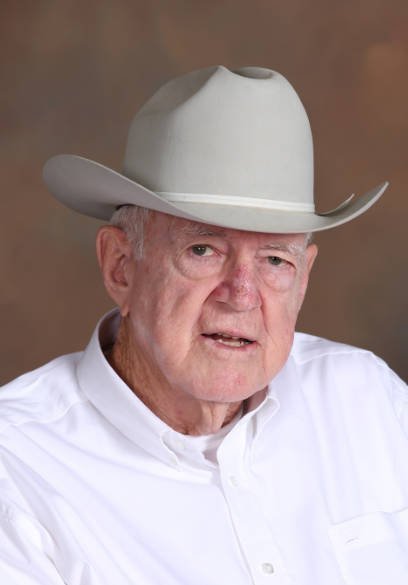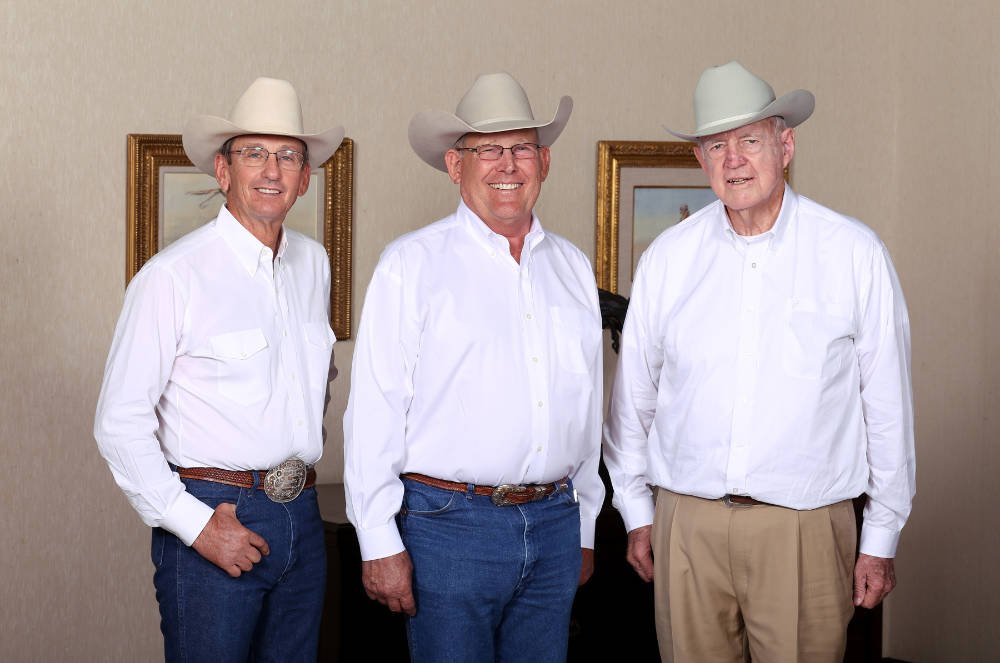In 1856 James Lowe and his bride Melissa Jane “Lizzie” Lowe had located in the wilds of the south Texas brush country on the Atascosa River and soon moved to near present day Tilden in McMullen County, just west of Choke Canyon Reservoir. In early settlement days, Tilden, formerly known as “Dog Town”, because of the large number of cow dogs that were used to gather cattle in the brush, was recognized as the capital of the brush country cattle empires. The Lowes were among the first settlers. For those of you who enjoy reading about those early range days, the exploits of James Lowe can be found in chapter 16 of J. Frank Dobie’s “Vaquero of the Brush Country”. Dobie referred to Lowe as “the most extensive cowman of Atascosa and McMullen County.”
Lizzie and James raised three sons, one of which, William Adolphus Lowe, was the great grandfather of our honoree. W. A., “Dolphus”, as he was known, was said by our honoree to have accomplished more in the cattle business than anyone else in the family – at least of that generation. Part of that 10,000 acre ranch on the Frio River remains in the Donnell family today.
Jim’s father, J. W. “Big Jim” Donnell purchased ranchland from relatives and neighbors to put together what the family manages today. Jim says his father never paid big prices for land, but “in those days $20 an acre was a lot of money, and given that it was done with cattle money, he had to dig pretty deep for it. Today that same land would bring $2,000 an acre. The sorrier the land, the more these hunters want it! Today if you gave a dollar an acre to graze it, that’s too much”.
From his father, Jim says he learned first and foremost how to work. “In the summer time when everyone else was going off to camp – well, i went to camp – real camp, and it wasn’t all that much fun. If i came in late, he got up that much earlier, and so I got up as well.” Though the Donnells ran both cows and steers, the country was best suited for steers. “It wasn’t good to get caught with too many cows in this country, Jim says, we might take a hell of a beating with steers, but we could at least sell them if it turned off dry. With the cows, we’d have to burn lots of pear to get them through, and we burned lots of pear, I’ll tell you for sure sometimes nearly year round.” For years, most of the country they operated was leased country, so the idea of making improvements was not a priority. Jim says, “the pastures were big, 5000, 6000, 7000 acres, – and we worked them horseback, never having enough pens, or traps. Daddy never believed in spending money. When he died, we were ill prepared and had to spend a lot of money building tanks and fences.” When it came time for Jim to go back to the ranch after college at the University of Texas, he said he really did not have anything else he wanted to do, but as it was he really had to go back. Jim remarked, “I wouldn’t sell this land because three or four generations before me sweated blood to put it together, and I’ve been the lucky one to end up with it.”
Born in 1936 in San Antonio, Jim graduated from Texas Military Institute, and the University of Texas with a BBA and served in the Texas Air National Guard. He has served his community in many capacities, as a director of several regional banks, a former director of the Nueces River Authority, the Dos Rios Soil Conservation District and the McMullen County Historical Commission. He was a director and now honorary vice-president of the Texas and Southwestern Cattle Raisers Assoc. In 1975, he received the Texas Section of the Society for Range Management Certificate of Recognition for Excellence in grazing management of rangeland. In 2000 he was named Outstanding Resident Conservation Rancher for region III by the Soil and Water Conservation Districts of Texas.
He and his charming wife, the former Eleanor Leighton Johnson have two children, James L. “Jamie” Donnell, Jr. and Cydney Donnell Lotito and five grandchildren. Today, the Donnell family operate ranches primarily in McMullen and La Salle counties in South Texas and in Presidio County in far west Texas. Son Jamie and Jim run commercial cross cattle in both cow-calf and stocker-feeder operations.
Jim says he has seen many changes in the cattle and ranching business over the last 60 years. When he was a kid they worked cattle horseback from the 5th of July until Labor Day when he had to go back to school. They saddled their horses before daylight and worked until noon, rested during the heat of the day, then worked until dark — seven days a week. They followed a chuckwagon with the camp cook from pasture to pasture. He says, “Now we have pickups, trailers, helicopters, and all kinds of equipment to lessen the need for cowboys and the way we work cattle. The most important changes he has seen have been the eradication of the fever ticks, and screw worms. The use of helicopters rather than cowboys to work and gather cattle in the brush, and better working pens and facilities. We are now able to operate with very little help and much more efficiency”.


